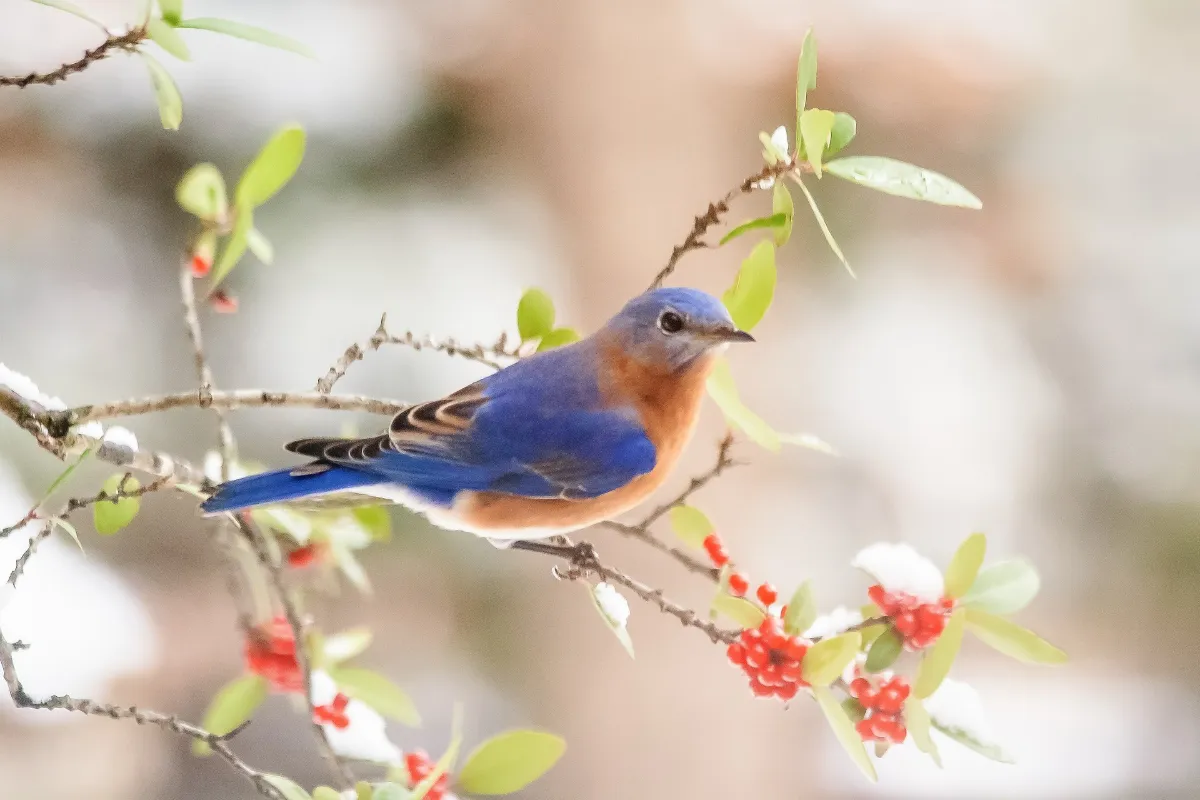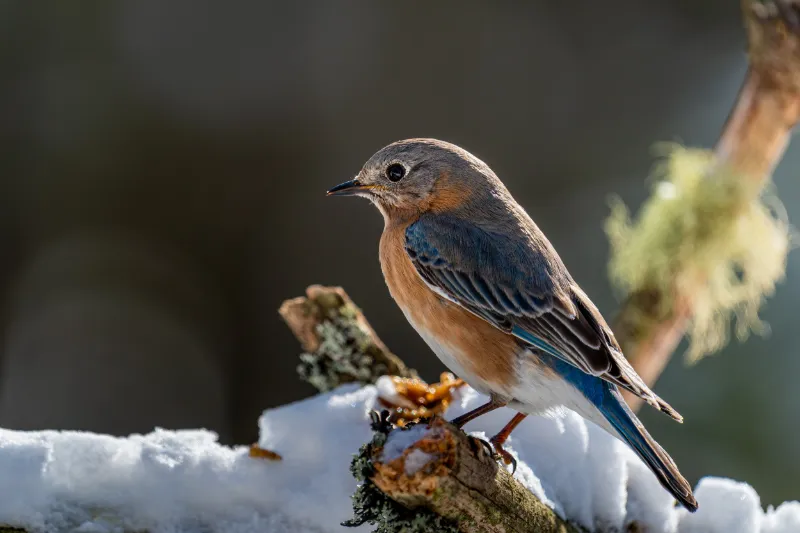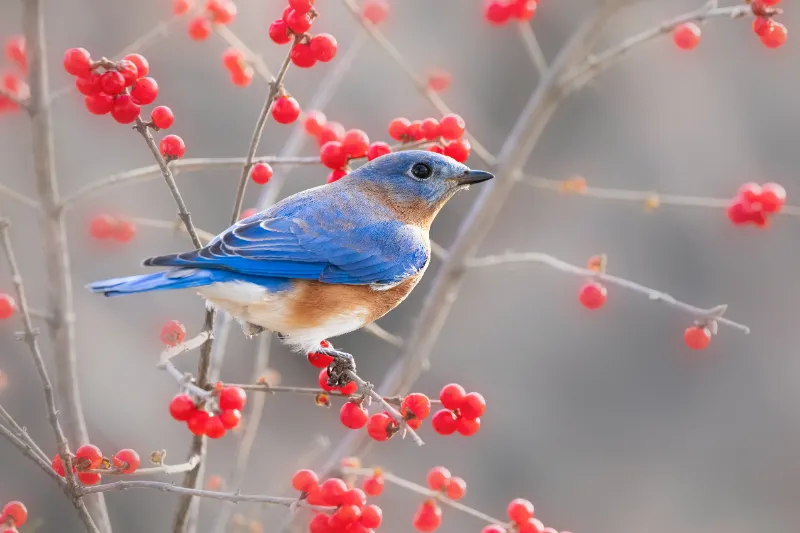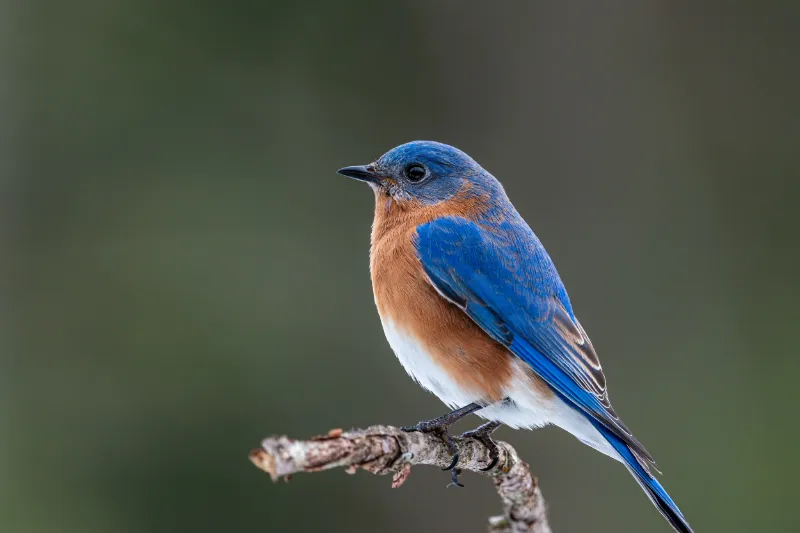What Do Bluebirds Eat? A Complete Guide to Bluebird Nutrition

What do Bluebirds eat is mostly asked by new bird enthusiast. Bluebirds are beautiful songbirds that can be found in North America, Europe, and Asia. These birds are known for their dynamic blue feathers and melodious songs. This feature makes them a favorite among birdwatchers and nature lovers.
If you are interested in attracting bluebirds to your backyard, you may be wondering what these birds eat. In this article, we will discuss what do Bluebirds eat, the diet of bluebirds. Also, we will cover their favorite foods and the nutritional requirements for better health.

Image Source: ( Source: Skyler Ewing: Pexels.com)
The bluebirds are members of the Sialia of thrush (Turdidae) family. The thrush family includes mostly small birds, which includes robins as well. Such birds are mostly found in North America the Eastern Bluebird, the Western Bluebirds, and the Mountain Bluebird.
You can find such birds in the open fields, meadows, and farmland. Since they are mostly on farms or lurk in the field, their diet includes worms, insects, etc. Apart from this, they will also love to eat fruits, seeds, and many more.
Types of Bluebirds
There are three species of bluebirds found in North America. They are slightly different from each other regarding their diets and habitats. The three species are;
Eastern Bluebird
These birds are found throughout the eastern United States and feed on insects, fruits, and berries. They are cavity nesters and are often found in open fields and meadows.
Western Bluebird
These birds are found in the western United States and are also cavity nesters. They feed on insects, fruits, and seeds and are often found in forests and woodlands.
Mountain Bluebird
These birds are found in the western United States and Canada and feed primarily on insects. They are often found in high-altitude habitats, such as mountain meadows and tundra.
The Diet of Bluebirds
The primary source of the bluebird diet comes from insects but they also love eating fruits and seeds. Also, the diet depends on the habitat and the time of the year. There are some common foods they like to eat for the whole year. That includes;
Insects
Bluebirds eat a variety of insects which includes caterpillars, beetles, grasshoppers, and crickets. They are especially fond of mealworms because it’s rich in protein and fat.
Fruits
Bluebirds also love eating a variety of fruits such as elderberries, blackberries, blueberries, and grapes. These fruits are a good source of carbohydrates. Thus, it helps bluebirds to gain energy.
Seeds
Bluebirds eat some types of seeds, such as sunflower seeds. It is found that they rarely like to eat such sources of food.
What Do Bluebirds Eat? Bluebird Food Preferences
Every bird has their own food preferences. When it comes to bluebirds they have their own as well. If you ever come to put some food of their liking, Bluebirds will love to eat. Some of the best meals they would like to have are;
Mealworms
Bluebirds love mealworms and will eat them without thinking it twice. You can purchase live or dried mealworms from pet stores or online retailers. They are easily available everywhere.
Berries
Bluebirds enjoy eating berries, especially elderberries, blackberries, and blueberries.

(Image Source : Photo by Hal Moran: Pexels.com)
You can offer fresh or dried berries in a platform feeder or on a tray feeder. Those berries are easy to eat and are good sources of getting energy and nutrition.
Suet
Bluebirds will eat suet if it is offered. Since it is made out of cow and sheep fat, it is good for them to have such meals.
Bluebirds have a variety of diet that includes insects, fruits, and berries. Insects provide much of their nutrition. They prefer insects that are high in protein such as mealworms, crickets, and grasshoppers. They also love to eat spiders, caterpillars, beetles, and ants.
In addition to insects, bluebirds will also eat fruits and berries, especially in the fall and winter months when insects are harder to find. They enjoy eating fruit that is high in sugar, such as elderberries, raspberries, and blueberries. They will also eat other types of fruit, such as grapes and apples.
When offering food to bluebirds, it is important to keep in mind their natural diet preferences. Mealworms are an excellent food choice for bluebirds, as they are high in protein and are a favorite among many bluebirds. You can offer mealworms in a shallow dish or platform feeder, or sprinkle them on the ground.
| Read More: How to Attract BlueBirds? A Complete Guide
Fruit can also be offered to bluebirds, but it is important to offer only fresh, ripe fruit. Bluebirds will not eat fruit that has started to rot or ferment, as it can be harmful to their health.
It is not recommended to offer bluebirds bread, as it does not provide the necessary nutrition for their diet. It is also important to avoid offering foods that are high in salt or sugar, as these can be harmful to bluebirds.
By providing a variety of foods that are in line with their natural diet preferences, you can attract bluebirds to your backyard and provide them with the nutrition they need to thrive.
Nutritional Requirements for Bluebirds
Bluebirds have specific nutritional requirements to maintain optimal health. They need a diet that is high in protein, fat, and carbohydrates. Here are the nutritional requirements for bluebirds:
Protein
Bluebirds need a diet that is high in protein. They need it more when they are in the breeding season. Protein helps support egg production and the growth of their chicks.
Fat
Bluebirds need a diet that is high in fat to help them survive the colder temperatures during the non-breeding season.
Carbohydrates
Bluebirds need carbohydrates for energy, but they do not rely heavily on them. It is because they mostly depends on insets rather than berries or seeds.
What Do Bluebirds Eat in Different Seasons?
Bluebirds have different diets in different seasons. During the breeding season (spring and summer), they need a diet that is high in protein to support egg production and the growth of their chicks.
During the non-breeding season (fall and winter), they need a diet that is high in fat to help them survive the colder temperatures. Here are some tips for feeding bluebirds in different seasons:
Spring and Summer
You should offer foods that are high in protein such as mealworms, crickets, and suet. You can also offer fresh or dried fruits, such as raisins or currants.
Fall and Winter
During fall and winter, it is best to offer foods that are high in fat, such as suet, peanut butter, and sunflower seeds. You can also offer dried fruits or mealworms to supplement their diet. It is done because it helps them to remain warm.
Bluebird Feeding Habits
Bluebirds are active during the daytime. They typically feed on the ground or in low vegetation, but they will also feed from elevated feeders.
Bluebirds are not aggressive feeders and will often wait their turn at a feeder. They will put some extra foods to consume it later.
Tips for Feeding Bluebirds
If you want to attract bluebirds to your backyard. Here are some tips which will help you to make them come over to your backyard.
- Offer foods that are high in protein, such as mealworms, crickets, and suet.
- Offer foods that are high in fat, such as suet, peanut butter, and sunflower seeds.
- Offer fresh or dried fruits, such as raisins or currants.
- Provide a platform feeder or a tray feeder for ground-feeding bluebirds.
- Offer an elevated feeder for bluebirds that prefer to feed off the ground.
- Keep your feeding area clean to prevent the spread of disease.
- Offer clean, fresh water for drinking and bathing.
Attracting Bluebirds to Your Backyard
If you want to attract bluebirds to your backyard, there are several things you can do:
Provide nesting boxes
Bluebirds are hollow nesters and will readily use a nesting box. Make sure the entrance hole is the right size and that the box is placed in a suitable location.

Image Source:
They are less likely to visit your homemade nest. But if you put some berries or worms inside the nest, the chances of them coming to that place will increase.
Plant native trees and shrubs
Bluebirds prefer open habitats with nearby trees and shrubs. Planting native trees and shrubs can provide a suitable habitat for bluebirds. This process will take time but it will be worth it when they began making nests.
Offer water
Bluebirds need water for drinking and bathing. Providing clear water or a fountain near their nest will increase the probability of them staying for a longer period of time.



